Hire Dedicated Mobile App Developers in Australia: Step-by-Step Hiring Process
A dedicated mobile app developer is a specialized professional or team from a software agency who works exclusively on your project as an integrated extension of your in-house team. When you hire dedicated mobile app developers, your project will benefit from their deep technical knowledge, custom app solutions, superior user experience, structured project management, security compliance, and continuous support.
This article from Groove Technology explains the role of these developers, the process to hire dedicated mobile developers, and the criteria for selecting the right team. The information provided here guides you through making a well-founded decision for your application’s development.
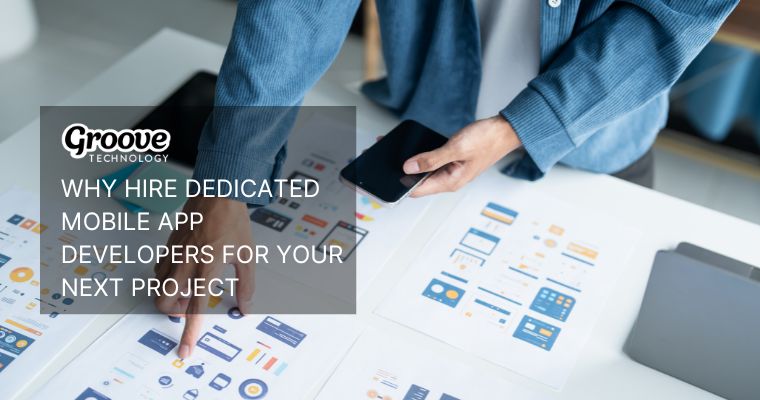
1. What are dedicated mobile app developers?
Dedicated mobile app developers are professionals who specialize in creating high-quality mobile applications for platforms like iOS and Android. They are professionals from an agency who focus all their efforts on a single client’s project, operating as a specialized extension of the client’s team. Hire dedicated mobile app development team helps to deliver focused expertise for high-quality results without the overhead of managing an in-house development team.
Dedicated developers work exclusively on one client’s project, offering specialized skills and native app optimization for best performance
 2. Why is hiring dedicated mobile application developers your solution?
2. Why is hiring dedicated mobile application developers your solution?
Hiring dedicated mobile application developers provides businesses with direct access to in-depth technical expertise, customized app solutions, enhanced user experience, adherence to compliance and security standards, structured project management, and ongoing support and maintenance. Each of these strengths plays a key role in building reliable mobile apps, and the following sections will explain how they add real value to your project. Choosing to hire dedicated mobile app development team ensures your project will benefit from the advantage of outsourcing software development below:
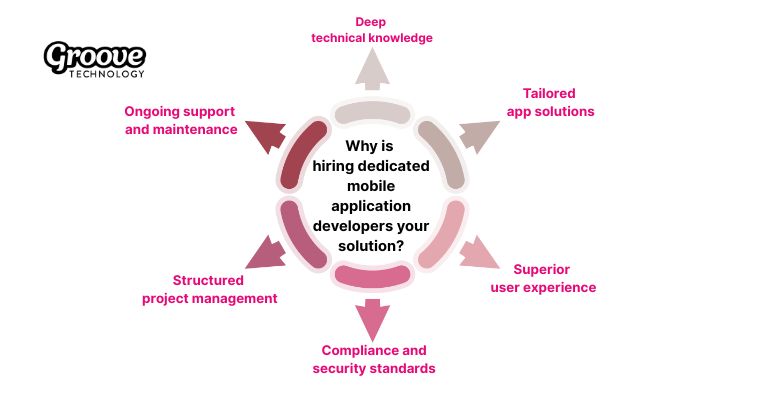
Deep technical knowledge
Dedicated mobile app developers have deep technical knowledge and experience to build high-performing and reliable applications using advanced tools and proven methods. Their expertise encompasses modern technologies such as AI, machine learning, cloud computing, and AR/VR, which collectively enable the design of apps that manage complex features with stability and speed.
Their strong command of technology enables them to deliver scalable solutions that adapt to market demands and maintain consistent quality across all functions. By opting to hire dedicated resources mobile developers, businesses gain access to this specialized skill set without long-term overhead.
Tailored app solutions
Dedicated developers can build mobile apps that are tailored for your business with features that deliver real value and efficiency by analyzing your objectives, target audience, and workflow. This ensures your mobile application aligns perfectly with your business goals and customer needs. Unlike generic apps, customized solutions are designed to scale with your growth, enhance user engagement, and strengthen your market presence, giving your business a unique edge in an increasingly competitive digital landscape.
Superior user experience
Developers focus on applying UX and UI best practices to design interfaces that engage users and keep them satisfied with every interaction. Superior user experience focuses on creating mobile apps that are intuitive, visually appealing, and easy to navigate.
Their attention to usability and aesthetics improves app performance and boosts user retention, while thoughtful layout and smooth navigation help users complete tasks efficiently. By prioritizing a seamless experience, developers enhance overall satisfaction and make the app enjoyable and reliable for daily use. Working with a dedicated mobile app development team ensures that the app experience is consistently refined and user-centric.

Compliance and security standards
Dedicated mobile app developers implement strong security measures that safeguard user data and reduce potential risks, while also making sure your app meets all legal requirements. Compliance and security standards protect both your business and its users by following industry regulations and privacy guidelines.
Their adherence to these standards builds trust with customers and strengthens your brand reputation, and careful monitoring of security protocols helps prevent breaches and vulnerabilities. By prioritizing compliance and protection, developers create a safer and more reliable application environment for all parties involved.
Structured project management
Dedicated developers apply proven methodologies to plan tasks, track progress, and manage resources efficiently, while maintaining open communication with clients. Structured project management provides a clear framework for outsourced mobile software development, keeping the project organized, on schedule, and within budget. Regular updates and transparent reporting enable you to stay informed about any challenges and developments, while consistent task coordination ensures milestones are met.
Ongoing support and maintenance
An effort to hire dedicated mobile app developers provides businesses with support and maintenance, ensuring that a mobile app continues to perform reliably after launch, remains functional, and stays up to date.
Dedicated developers manage bug fixes, performance optimizations, security updates, and feature enhancements, allowing the app to adapt to evolving user needs and technological changes. Consistent maintenance and timely issue resolution preserve smooth operation and stability, while continuous improvements enhance the overall user experience.
3. How to hire dedicated mobile app developers?
To hire dedicated mobile developers, you can follow the process including six key steps below:
- Step 1: Define Your Project Requirements
- Step 2: Choose the Right Hiring Model
- Step 3: Research and Shortlist Potential Companies or Freelancers
- Step 4: Conduct Technical Interviews & Evaluate Skills
- Step 5: Discuss Communication & Project Management
- Step 6: Sign Contract & Start the Development
In this next section, we will provide a more detailed examination of these steps.
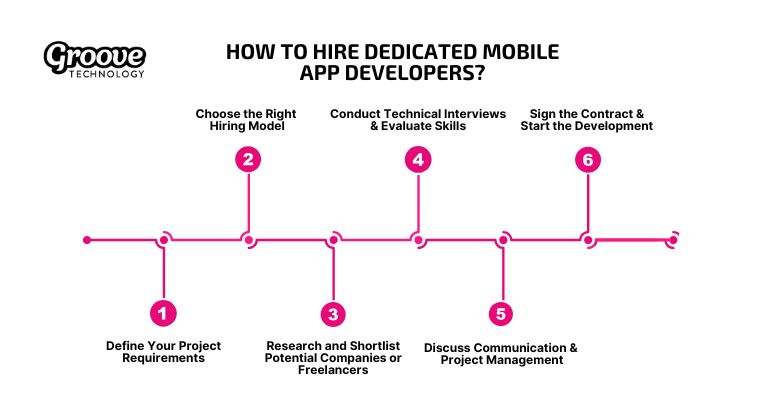
Step 1: Define Your Project Requirements
Clear project requirements form the foundation of any successful app development. We always recommend that you start by describing the type of app you plan to build, whether it’s native, hybrid, or cross-platform. You should also identify your target platforms such as iOS or Android, your budget range, and the expected delivery timeline.
A well-defined goal helps both sides avoid confusion later on and allows us to match you with developers who have the right skills and relevant experience to deliver exactly what your project needs. The clearer your vision is, the smoother the development process will be from the start because everyone understands the same objectives.
Step 2: Choose the Right Hiring Model
The hiring model determines how your team operates and how costs are managed. For large, ongoing projects, a dedicated full-time team is usually the best choice, as it provides consistent focus and long-term stability, while part-time developers can help balance efficiency with budget control for smaller or medium-sized apps.
In some cases, an hourly-based model works best because it offers flexibility for maintenance or periodic updates. We usually help clients pick a model that aligns with their workflow and financial plan so that every dollar spent translates into real progress and the cooperation stays smooth.
Step 3: Research and Shortlist Potential Companies or Freelancers
Proper research saves you from future headaches and wasted effort. You can start by checking trusted platforms like Clutch, Upwork, or LinkedIn to find credible outsourcing partners, as their portfolios, client feedback, and case studies show how they deliver projects and whether they align with your goals.
Most importantly, ensure they have hands-on expertise with your required technologies such as React Native, Flutter, Swift, or Kotlin. At Groove Technology, we often show clients projects similar to theirs to help them gauge compatibility and confidence, and a well-documented shortlist helps narrow down the best choices before you move to interviews. That’s why choosing to hire dedicated resources mobile developers from Groove Technology ensures you work only with professionals who deliver tangible results.
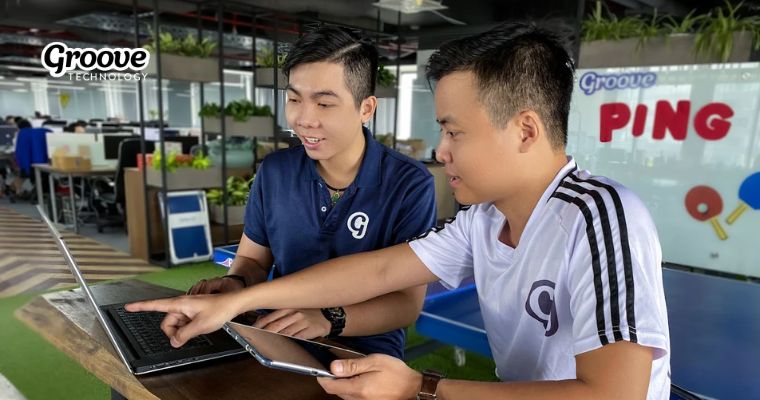
Step 4: Conduct Technical Interviews & Evaluate Skills
Technical interviews reveal how capable and reliable a developer truly is and help you identify both technical strength and communication skills. You should evaluate their programming knowledge, logical thinking, and problem-solving approach, and ask about their workflow, Agile or Scrum methods, and how they manage bugs and data security.
A short coding test or technical assignment is also useful for confirming their skill level, as it shows their actual performance beyond words. We usually run small test projects to measure coding style, accuracy, and collaboration speed, and these early checks prevent mismatched expectations once the real project begins.
Step 5: Discuss Communication & Project Management
Communication builds trust and keeps your project on track by connecting everyone involved. Defining how updates are shared, whether through Slack, Jira, Trello, or Asana, ensures everyone stays informed and reduces misunderstandings. You should also assign a project manager who handles progress reports, meetings, and feedback loops.
Transparency about time, progress, and costs keeps the workflow smooth and open. At Groove Technology, we emphasize regular check-ins and honest discussions so your feedback shapes every development phase and your project moves forward without delay.
Step 6: Sign the Contract & Start the Development
The contract formalizes the agreement and protects both parties, and it should clearly state the scope of work, data privacy terms (e.g., NDA), and the payment schedule. Having everything documented avoids conflicts later on and gives both sides confidence to move forward with clarity.
Once the contract is signed, onboarding begins, and we introduce your dedicated team while launching the project plan with measurable milestones. From that point, progress tracking becomes consistent and your mobile app starts turning from an idea into a working product that reflects your goals.

4. What are the criteria to choose the best dedicated mobile app developers?
A successful hiring decision relies on clear standards, and five key criteria can guide you toward the right dedicated mobile app developers for your project. Each factor plays a crucial role in establishing a reliable partnership that leads to a robust and functional mobile application.
- Technical expertise & portfolio: Platform proficiency and a proven portfolio reflect a developer’s real-world skills. Developers should demonstrate mastery in Swift, Objective-C, Java, or Kotlin for native apps, and familiarity with Flutter or React Native for cross-platform projects. Reviewing past works also shows whether they can handle projects similar to yours and maintain high client satisfaction.
- Communication & project management: Transparent communication and structured management help avoid misunderstandings. Developers who maintain open dialogue, respond promptly, and provide consistent progress updates can keep the project on track. Dedicated managers and clear contact channels foster accountability and ensure smooth collaboration throughout development.
- Track record & trustworthiness: A strong background and positive client feedback indicate reliability and long-term commitment. Checking reviews on trusted platforms or exploring client testimonials reveals consistency in quality and professionalism. Experienced developers with a good reputation are more likely to meet expectations and maintain transparency.
- Support & scalability: Ongoing maintenance and adaptability keep the app relevant after launch. Developers who provide post-launch updates, bug fixes, and scalability solutions help your product grow with the user base. Consistent support keeps the app’s performance steady and maintains user satisfaction over time.
- Security & legal: Data protection and clear agreements strengthen business confidence. Developers should adhere to robust security protocols and handle user data with care and responsibility. A well-written contract that clearly defines deadlines, deliverables, ownership rights, and confidentiality terms helps prevent disputes and protects the integrity of your project.
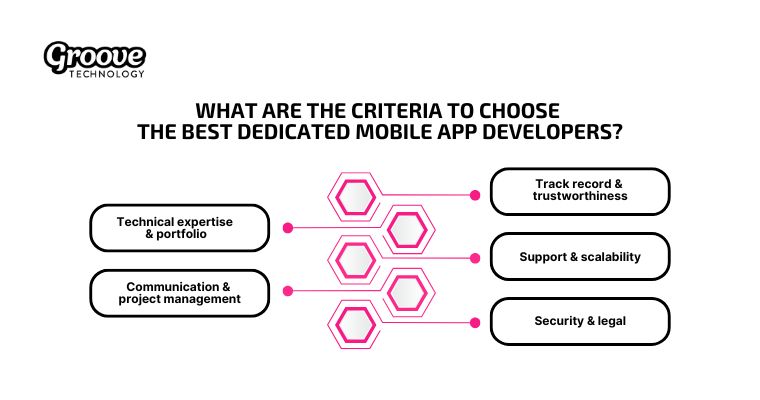
5. Outsourcing vs. In-House: Which is better when hiring app developers?
The decision between outsourcing and in-house development often depends on business goals, budget, and the desired level of control over the project. Each model has its own benefits and challenges, and understanding these helps companies choose the path that best fits their long-term strategy.
Outsourcing provides access to a large pool of skilled developers and reduces costs, as companies only pay for the specific services they need. It also provides flexibility to scale teams easily. However, it may involve less direct control and potential communication or security risks.
On the other hand, in-house development gives complete control, faster communication, and closer alignment with company goals. Yet, it demands higher costs, long hiring cycles, and continuous investment in infrastructure and training.
The comparison below outlines how each option performs across major factors:
| Criteria | In-House Development | Outsourcing |
| Project Control | Direct control over all project aspects, enabling quicker adjustments and close alignment with your vision. Keeps intellectual property within the company, reducing information loss risk. | Layered control, as an external partner, manages the project. Requires clear communication to stay aligned and may reduce daily oversight. |
| Cost Structure | Higher costs due to ongoing salaries, benefits, and infrastructure expenses, even after project completion. Includes recruitment, training, and overhead costs. | Lower costs since payment is based on specific services without long-term overhead. No salary commitments or infrastructure expenses. |
| Expertise Access | Limited to the skills of internal staff, requiring extra training or hiring for specialized tasks. | Access to a wider talent pool with specialized knowledge reduces the need for internal training. |
| Team Scalability | Slower scaling due to recruitment and onboarding time. Requires additional investment to grow the team. | Flexible scaling up or down based on project needs. Quick adaptation to workload changes. |
| Communication | Easier collaboration with face-to-face feedback and stronger cultural alignment. | Possible communication gaps due to time zone or language differences. Needs structured communication processes. |
| Intellectual Property | Full ownership and data security remain within the organization. | Requires clear legal agreements to protect IP and minimize security risks. |
| Time to Market | Slower start due to hiring and setup but faster later once the team stabilizes. | Faster project launch as experienced teams are readily available without recruitment delays. |
Ultimately, the best choice depends on your organization’s priorities — whether that’s cost savings, speed, control, or long-term capability building.
6. How much does it cost to hire dedicated mobile app developers?
According to Clutch, the average cost of hiring app developers ranges from $25 to $49 per hour, while most complete mobile app projects typically cost between $12,000 and $49,000. These cost to outsource software development team vary depending on nine factors as below:
- App complexity: App complexity shapes overall development pricing. Simple apps with limited features are more affordable, but advanced ones, such as e-commerce or social apps that require real-time chat, AI features, and large databases, necessitate more coding and testing, thereby increasing total costs.
- Design requirements: App design demands strongly affect the final budget. Basic layouts cost less, while visually appealing designs with animations, motion effects, and detailed branding require professional UI/UX designers and longer design cycles, resulting in both increased time and financial investment.
- Development team expertise: Developer experience and team setup influence pricing. Freelancers usually charge lower rates but may lack coordination, whereas professional agencies, which include project managers, tech leads, and QA teams, deliver reliability at a higher service fee.
- Third-party integrations: Integrations expand workload and raise expenses for the projects. Each added API, such as those for payment gateways, social media login, or geolocation, requires separate configuration and testing to ensure stability, which increases both development duration and cost.
- Compliance and security standards: Compliance and security requirements elevate project costs. Apps that handle private or financial data must include encryption, privacy controls, and secure authentication systems, which require skilled developers and increase technical effort.
- App platform: Platform selection defines development scope and cost. Building an app for either iOS or Android is more cost-effective, while creating both native versions or adopting a cross-platform solution requires additional setup, design adaptation, and testing efforts.
- Tech Stack: The chosen technologies determine cost variation. Using specialized frameworks or high-performance databases increases development time and requires skilled experts, whereas outsourcing often helps reduce costs by accessing pre-built tools and expert support.
- Quality assurance (QA): QA testing directly affects expenses. Functional and security testing ensures reliability, but complex apps with multiple user interactions require extended test cycles, raising costs for both manual and automated QA procedures.
- Maintenance: Maintenance represents a continuing cost after launch. Regular updates, OS adjustments, and feature upgrades keep the app functional and secure. More complex apps usually require frequent maintenance sessions, contributing to ongoing expenses.
7. Tips on how to hire dedicated mobile app developers
Hiring the right developer requires careful evaluation across several key areas to build a successful partnership and deliver a high-quality product. Below are nine practical tips to help companies select skilled professionals who align with their goals and deliver reliable, long-term value.
- Cultural alignment: Culturally aligned teams create a smoother workflow and stronger teamwork. Shared values and working habits enhance communication, prevent conflicts, and foster consistent collaboration, enabling both parties to remain productive and connected throughout the project.
- Industry standards: Industry standards guarantee code quality and project stability. Developers familiar with current best practices follow structured methods, use clean code principles, and maintain technical consistency, which reduces rework and supports scalable app performance.
- Design principles: Design principles influence usability and customer satisfaction. Developers who understand UX and UI concepts can create intuitive navigation, attractive layouts, and balanced visuals, enabling the app to function smoothly while meeting both brand and user expectations.
- Version control: Version control maintains accuracy and teamwork during development. Developers skilled in tools like Git can manage code changes efficiently, collaborate on updates, and track progress clearly, reducing the risk of errors and improving delivery speed.
- Project planning: Project planning sets a clear foundation for timely delivery. Developers who present detailed timelines, milestone breakdowns, and defined deliverables make the workflow predictable, minimize confusion, and support accountability through every stage of development.
- Technology updates: Technology updates keep the app modern and efficient. Developers aware of new frameworks, programming languages, and tools can adopt more effective solutions, enhance performance, and extend the app’s lifecycle, helping it remain competitive in a rapidly evolving market.
- Intellectual property: Intellectual property protection builds trust and safety. Developers who respect ownership agreements and sign NDAs keep your business ideas confidential, safeguarding proprietary code, designs, and sensitive information from misuse or unauthorized access.
- Problem-solving capacity: Problem-solving capacity measures technical strength and adaptability. Developers who approach challenges logically, debug issues effectively, and adapt to changing project needs contribute to smoother development and more dependable app performance.
- Team collaboration: Effective team collaboration enhances the final output. Developers experienced in working with designers, marketers, and stakeholders improve communication flow, align creative and technical elements, and create an app that meets both functional goals and business needs.
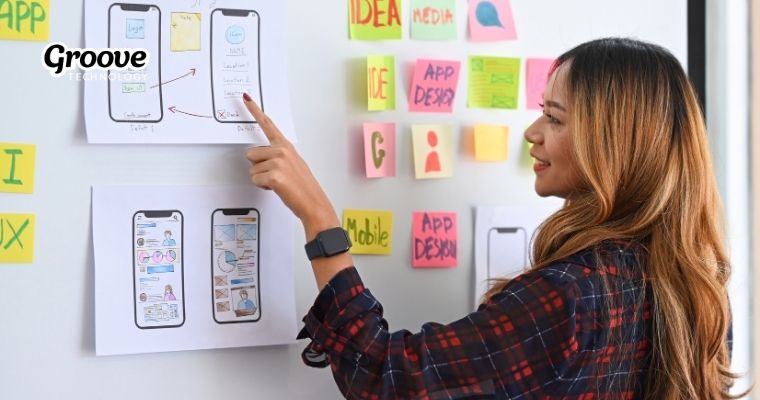
8. Why should you choose Groove Technology for hiring dedicated mobile app developers?
At Groove Technology, businesses can hire dedicated mobile app developers who combine technical excellence with collaboration, flexibility, and transparency. Below are our four unique strengths that set us apart in delivering reliable and scalable app development solutions.
- Easy onboarding: A streamlined onboarding process helps projects start quickly and integrate seamlessly. Our developers seamlessly adapt to frameworks like Agile, Scrum, or Kanban, ensuring efficient coordination and minimal downtime from the outset.
- Transparent cost management: A clear cost structure ensures simple and predictable financial planning. Every project includes upfront pricing, milestone-based payments, and flexibility to scale resources, ensuring full control and accountability.
- Quality assurance: A rigorous recruitment and continuous training system guarantees high technical standards and consistent performance. Each developer is selected for both skill and mindset, ensuring dependable quality and long-term partnership value.
- Diverse skill portfolios: A broad pool of talent covers iOS, Android, cross-platform, and AI-driven applications. Our specialists recommend the most effective tech stack for your goals and budget, helping your business innovate with confidence.
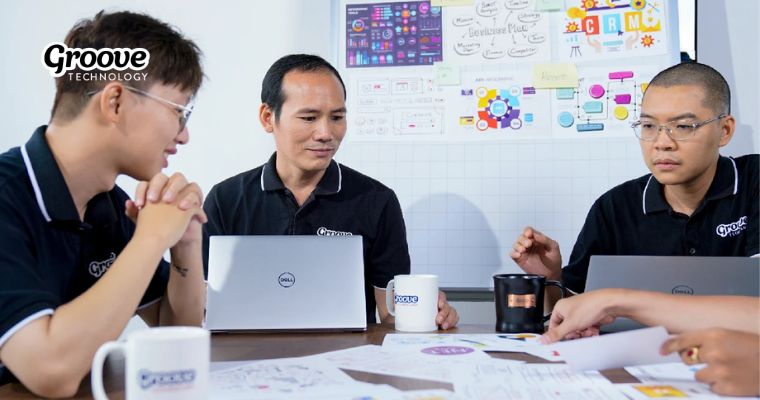
9. Tech stacks for dedicated mobile app development at Groove Technology
Groove Technology applies six technology stacks to build powerful, scalable, and secure mobile applications. Each stack supports a specific function in the development process, enabling projects to remain efficient and adaptable across various platforms.
- Core mobile app development: React Native, Vue.js
- Frontend technologies: JavaScript, Vuex (state management for Vue.js), Vue Router
- Backend solutions: Node.js, Python, Express.js (Node.js framework)
- Database management: MySQL, MongoDB
- Cloud Infrastructure: AWS (Amazon Web Services), Microsoft Azure
- DevOps and Security: Docker, Kubernetes
These technologies combine flexibility, reliability, and speed, allowing teams to build custom mobile apps that perform smoothly and adapt easily to changing business needs.
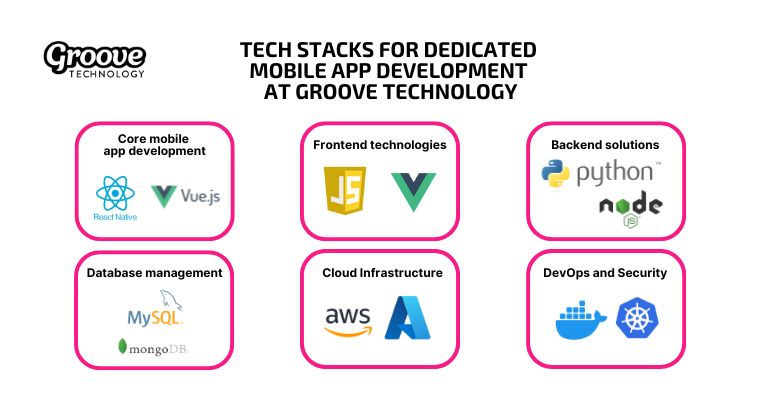
10. Frequently asked questions about hiring dedicated mobile app developers
Can I hire individual developers instead of a full development team?
Businesses can hire individual mobile app developers, and hiring them works best when they handle specific parts of a project. This method gives more flexibility and control over the development process while granting access to specialized skills in design, coding, or testing. Individual hiring is most effective when the project scope is clear and the goal is to bring in targeted expertise for specific tasks, making it a practical and cost-effective choice for focused development needs.
Can developers build apps for both iOS and Android platforms?
Yes, our developers have the skills to develop mobile applications for both iOS and Android, using the appropriate frameworks and tools. Their experience encompasses native, hybrid, and cross-platform app development, enabling every project to meet its specific goals and technical requirements effectively.
How do developers protect user data and privacy?
Developers protect user data by adhering to the Australian Privacy Principles (APPs) and implementing strong encryption to secure personal information during both transfer and storage. They use secure authentication to limit access to authorized users, regularly update security protocols to block new threats, and review how new features affect privacy. These combined measures keep user information safe and reduce the risk of data breaches.
What methods do developers use to ensure app quality?
Developers maintain app quality by following coding standards, applying thorough testing, and monitoring performance throughout development. They use automated and manual tests such as unit, integration, and user acceptance testing to detect and fix issues early, while continuous monitoring and feedback help refine speed, stability, and user experience for consistent, reliable performance.
Hiring dedicated mobile application developers helps businesses turn concepts into fully functional applications while keeping control over quality, budget, and delivery. This article highlights the benefits, processes, and skills required to select the right developers, and demonstrates how a dedicated team effectively addresses common development challenges.
Groove Technology connects businesses with experienced developers who deliver consistent results through collaboration and technical precision. For more details or consultation, please contact Groove Technology and hire dedicated mobile app developers for your next project.
Related Articles:
- Why Hire a Dedicated Software Developer in 2025?
- Software Development Staff Augmentation: A Brief Guide of Success 2025
- Outsourcing Software Development Services: Benefits, How To Hire And Cost




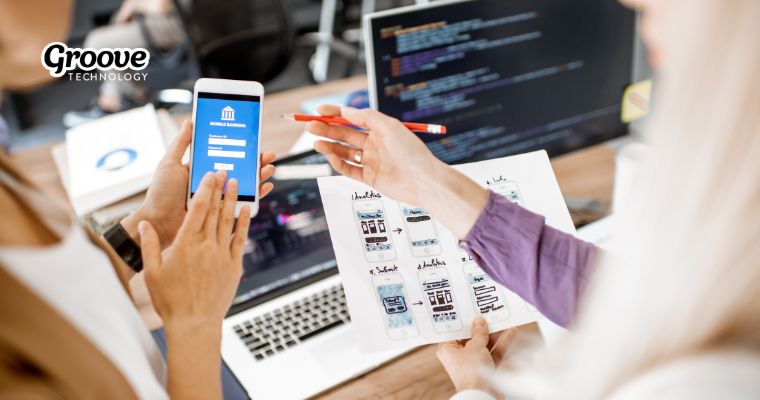 2. Why is hiring dedicated mobile application developers your solution?
2. Why is hiring dedicated mobile application developers your solution?
